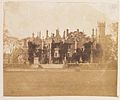Vivian family (baronets and barons)
British aristocratic family From Wikipedia, the free encyclopedia
Vivian is the name of a British noble family of Cornish extraction that rose to wealth in various regions of the British Isles. Over time, several members of the Vivian family were made knights, baronets and peers. Hereditary titles held by the family include the Vivian barony as well as the Swansea barony. Several other members of the family have also risen to prominence.
History
Summarize
Perspective
The Vivian baronets and barons are a junior branch of the Vivian family of Trewan Hall, St Columb Major, Cornwall, from whom they are descended through John Vivian (1583–1647) of Trenoweth and Trewan.[1] Around 1800, one of his descendants, John Vivian (1750–1826) of Truro, became managing partner in the copper works at Penclawdd and Loughor owned by the Cheadle Brasswire Company of Staffordshire, and thus the first of the Vivian family to settle in Swansea. His son John Henry Vivian (1785–1855) continued and expanded the business, eventually owning copper mining, copper smelting and trading businesses in Swansea (Vivian & Sons), Liverpool, Birmingham and London. Between 1832 and 1855 he sat as Member of Parliament for Swansea District.[2] His brother Hussey Vivian (1775–1842) meanwhile pursued a military career in the British cavalry and commanded the 6th Brigade of the Earl of Uxbridge's Cavalry Division in the Battle of Waterloo. General Hussey Vivian was created a Baronet of Truro in the County of Cornwall in 1827,[3] and Baron Vivian, of Glynn and of Truro in the County of Cornwall, in 1841.[4] After John Henry Vivian's death in 1855, his sons Henry, Arthur and Glynn continued to run the family business and sit as Members of Parliament for Swansea. Through their enterprises in the area, the Vivian family did much to develop Swansea into a city, in much the same way as the Marquesses of Bute drove the development of Cardiff. Henry Vivian was created a Baronet of Singleton in the Parish of Swansea in the County of Glamorgan in 1882[5] and Baron Swansea, of Singleton in the County of Glamorgan, in 1893.[6]
- John Henry Vivian (1785–1855), statue in Ferrara Square, Swansea
- Hussey Vivian, 1st Baron Vivian (1775–1842), portrait by William Salter
- Henry Vivian, 1st Baron Swansea (1821–1894), statue in Swansea
- Grave of the 3rd Baron Swansea at St. David's Church, Maesmynis, Builth Wells
Genealogy
Summarize
Perspective
John Vivian (1750–1826) ∞ 1774 Elizabeth Cranch (died 1816), daughter of the Rev. Richard Cranch, and had several children, including:
- Hussey Vivian, 1st Baron Vivian (1775–1842), Lieutenant General ∞ I 1804 Eliza Champion, daughter of Philip Champion de Crespigny,[7] ∞ II Letitia Webster, daughter of Rev James Agnew Webster, and had several children, including:
- Charles Vivian, 2nd Baron Vivian (1808–1886),[8] who married and had children (see the Vivian barons)
- John Cranch Walker Vivian (1818–1879), who married and had children
- Sir Robert Vivian (1802–1887), who married and had children
- John Henry Vivian (1785–1855), industrialist, owner of Singleton Abbey, Swansea[2] ∞ 1816 Sarah Jones (died 1886), eldest daughter of Arthur Jones, of Reigate, and had several children, including:
- Henry Vivian, 1st Baron Swansea (1821–1894), who married three times and had eight children, including:
- Ernest Vivian, 2nd Baron Swansea (1848–1922), who died unmarried
- Odo Vivian, 3rd Baron Swansea (1875–1934), who married and had children (see the Swansea barons)
- Sir Arthur Vivian (1834–1926), who married and had children
- Glynn Vivian (1835–1910), owner of Sketty Hall, Swansea, founder of the Glynn Vivian Art Gallery
- Henry Vivian, 1st Baron Swansea (1821–1894), who married three times and had eight children, including:
Titles in the family
- Vivian baronetcy, of Truro in the County of Cornwall (created 1828)[3]
- Vivian baronetcy, of Singleton in the Parish of Swansea (created 1882)[5]
- Baron Vivian (created 1841)[4]
- Baron Swansea (created 1893)[6]
Other notable members
- Hussey Vivian, 3rd Baron Vivian, GCMG, CB, DL, FRGS (1834–1893), diplomat
- Nicholas Vivian, 6th Baron Vivian (1935–2004), one of the 92 hereditary peers elected to remain in the House of Lords after 1999
- Herbert Vivian, grandson of John Cranch Walker Vivian. Writer, journalist and newspaper proprietor.
Residences
- Singleton Abbey with Singleton Park in Swansea, now housing the main campus of Swansea University
- Clyne Castle with Clyne Gardens in Swansea
- Sketty Hall in Swansea (the home of Glynn Vivian)
- Glynn House, near Cardinham, Cornwall (the home of the 1st Baron Vivian)
- Caer Beris, at Builth Wells, Powys (the home of the 3rd Baron Swansea)
- Pencalenick House, near Truro, home of John Cranch Walker Vivian
- Singleton Abbey in 1854
- Clyne Gardens, Japanese Pond
- Sketty Hall Classical Garden
The 1st Baron Swansea is buried in the churchyard of St Paul's Church in Sketty, Swansea. A number of Vivian family graves with Celtic-style headstones can be found at the Parish Church of St Winnow, Cornwall.
Arms
- Arms of the Vivians of St.Columb, Cornwall
- Arms of Hussey Vivian and the Barons Vivian, granted 1827
- Arms of John Henry Vivian and the Barons Swansea, granted 1827
Vivianite
The mineral vivianite (Fe3(PO4)2•8(H2O)) is named in honour of John Henry Vivian (1785–1855).
See also
References
Further reading
Wikiwand - on
Seamless Wikipedia browsing. On steroids.










